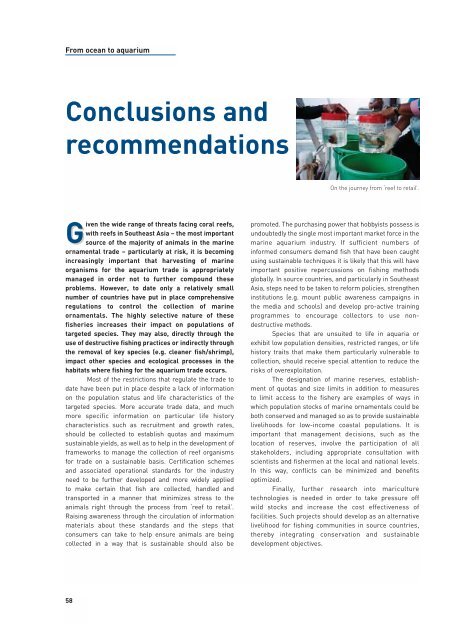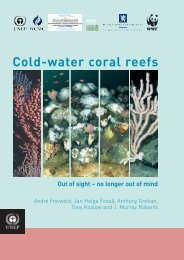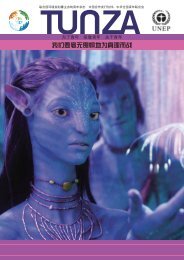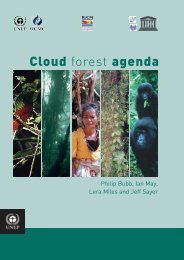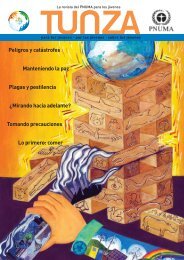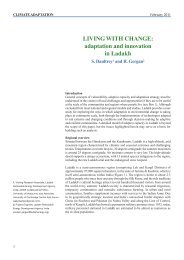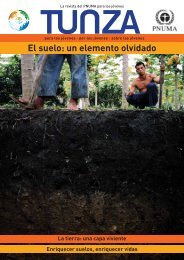The global trade in marine ornamental species
The global trade in marine ornamental species
The global trade in marine ornamental species
Create successful ePaper yourself
Turn your PDF publications into a flip-book with our unique Google optimized e-Paper software.
From ocean to aquarium<br />
Conclusions and<br />
recommendations<br />
On the journey from ‘reef to retail’.<br />
Given the wide range of threats fac<strong>in</strong>g coral reefs,<br />
with reefs <strong>in</strong> Southeast Asia – the most important<br />
source of the majority of animals <strong>in</strong> the mar<strong>in</strong>e<br />
<strong>ornamental</strong> <strong>trade</strong> – particularly at risk, it is becom<strong>in</strong>g<br />
<strong>in</strong>creas<strong>in</strong>gly important that harvest<strong>in</strong>g of mar<strong>in</strong>e<br />
organisms for the aquarium <strong>trade</strong> is appropriately<br />
managed <strong>in</strong> order not to further compound these<br />
problems. However, to date only a relatively small<br />
number of countries have put <strong>in</strong> place comprehensive<br />
regulations to control the collection of mar<strong>in</strong>e<br />
<strong>ornamental</strong>s. <strong>The</strong> highly selective nature of these<br />
fisheries <strong>in</strong>creases their impact on populations of<br />
targeted <strong>species</strong>. <strong>The</strong>y may also, directly through the<br />
use of destructive fish<strong>in</strong>g practices or <strong>in</strong>directly through<br />
the removal of key <strong>species</strong> (e.g. cleaner fish/shrimp),<br />
impact other <strong>species</strong> and ecological processes <strong>in</strong> the<br />
habitats where fish<strong>in</strong>g for the aquarium <strong>trade</strong> occurs.<br />
Most of the restrictions that regulate the <strong>trade</strong> to<br />
date have been put <strong>in</strong> place despite a lack of <strong>in</strong>formation<br />
on the population status and life characteristics of the<br />
targeted <strong>species</strong>. More accurate <strong>trade</strong> data, and much<br />
more specific <strong>in</strong>formation on particular life history<br />
characteristics such as recruitment and growth rates,<br />
should be collected to establish quotas and maximum<br />
susta<strong>in</strong>able yields, as well as to help <strong>in</strong> the development of<br />
frameworks to manage the collection of reef organisms<br />
for <strong>trade</strong> on a susta<strong>in</strong>able basis. Certification schemes<br />
and associated operational standards for the <strong>in</strong>dustry<br />
need to be further developed and more widely applied<br />
to make certa<strong>in</strong> that fish are collected, handled and<br />
transported <strong>in</strong> a manner that m<strong>in</strong>imizes stress to the<br />
animals right through the process from ‘reef to retail’.<br />
Rais<strong>in</strong>g awareness through the circulation of <strong>in</strong>formation<br />
materials about these standards and the steps that<br />
consumers can take to help ensure animals are be<strong>in</strong>g<br />
collected <strong>in</strong> a way that is susta<strong>in</strong>able should also be<br />
promoted. <strong>The</strong> purchas<strong>in</strong>g power that hobbyists possess is<br />
undoubtedly the s<strong>in</strong>gle most important market force <strong>in</strong> the<br />
mar<strong>in</strong>e aquarium <strong>in</strong>dustry. If sufficient numbers of<br />
<strong>in</strong>formed consumers demand fish that have been caught<br />
us<strong>in</strong>g susta<strong>in</strong>able techniques it is likely that this will have<br />
important positive repercussions on fish<strong>in</strong>g methods<br />
<strong>global</strong>ly. In source countries, and particularly <strong>in</strong> Southeast<br />
Asia, steps need to be taken to reform policies, strengthen<br />
<strong>in</strong>stitutions (e.g. mount public awareness campaigns <strong>in</strong><br />
the media and schools) and develop pro-active tra<strong>in</strong><strong>in</strong>g<br />
programmes to encourage collectors to use nondestructive<br />
methods.<br />
Species that are unsuited to life <strong>in</strong> aquaria or<br />
exhibit low population densities, restricted ranges, or life<br />
history traits that make them particularly vulnerable to<br />
collection, should receive special attention to reduce the<br />
risks of overexploitation.<br />
<strong>The</strong> designation of mar<strong>in</strong>e reserves, establishment<br />
of quotas and size limits <strong>in</strong> addition to measures<br />
to limit access to the fishery are examples of ways <strong>in</strong><br />
which population stocks of mar<strong>in</strong>e <strong>ornamental</strong>s could be<br />
both conserved and managed so as to provide susta<strong>in</strong>able<br />
livelihoods for low-<strong>in</strong>come coastal populations. It is<br />
important that management decisions, such as the<br />
location of reserves, <strong>in</strong>volve the participation of all<br />
stakeholders, <strong>in</strong>clud<strong>in</strong>g appropriate consultation with<br />
scientists and fishermen at the local and national levels.<br />
In this way, conflicts can be m<strong>in</strong>imized and benefits<br />
optimized.<br />
F<strong>in</strong>ally, further research <strong>in</strong>to mariculture<br />
technologies is needed <strong>in</strong> order to take pressure off<br />
wild stocks and <strong>in</strong>crease the cost effectiveness of<br />
facilities. Such projects should develop as an alternative<br />
livelihood for fish<strong>in</strong>g communities <strong>in</strong> source countries,<br />
thereby <strong>in</strong>tegrat<strong>in</strong>g conservation and susta<strong>in</strong>able<br />
development objectives.<br />
58


